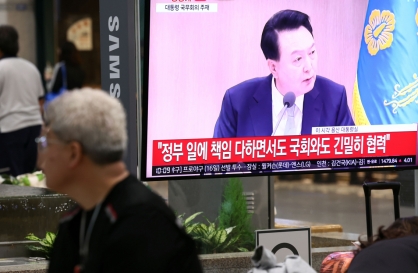Under the incumbent Lee Myung-bak government, domestic business groups have expanded their assets and operations at an alarmingly fast clip, and concerns have been rekindled about excessive concentration of economic power.
According to data recently released by the Fair Trade Commission, the top 20 business groups increased their asset holdings by 54.2 percent and the number of subsidiaries by 36 percent during the past three years. As of April 1, their combined assets reached 1,054.4 trillion won and the number of affiliates totaled 922.
One notable phenomenon is that bigger conglomerates grew faster, indicating a deepening concentration of economic muscle at top-tier groups. During the period, the assets of the top 10 groups swelled by 56.9 percent and the number of their affiliates by 49.5 percent. For the top five, the comparable growth rates were 59.1 percent and 51 percent, respectively.
The rapid expansion of the chaebol groups was facilitated by a set of pro-business policies introduced by the incumbent government. For instance, the government abolished the restrictions on shareholdings that a conglomerate can have in other companies. It also lifted the entry barriers for sectors reserved for small and medium-sized enterprises.
Furthermore, it lowered corporate tax rates, kept interest rates at record low levels for a prolonged period of time, and sought to create a business environment favorable for exporters.
These measures helped many big firms earn record profits in recent years. As a result, their coffers are awash with cash, as demonstrated by their high reserve ratios ― cash surplus measured against paid-in capital. Last year, the reserve ratios of the listed affiliates of the top 10 business groups averaged 1,219 percent, which means they had over 12 times more reserve cash than paid-in capital. In 2004, this ratio stood at around 600 percent.
The conglomerates used their cash reserves to establish new firms, acquire subcontractors to achieve vertical integration, and invest in emerging sectors. Through these activities, they sought to enhance competitiveness against their global rivals, diversify into new business areas and promote the development of new growth engines.
But their expansion also involved attempts to encroach upon what could be seen as the preserves of SMEs. One example is the affiliates they set up recently for group-wide procurement of office supplies and other goods. These firms have reportedly driven small stationery companies to the wall by expanding their businesses beyond the boundary of their groups.
The National Tax Service has recently announced a plan to look into the operations of chaebol groups’ non-listed subsidiaries, including the office supplies procurement firms, as they are suspected of being used as a vehicle for transferring corporate wealth to children of chaebol families.
These firms can easily pump up their profits and value by getting sweet deals from other affiliates. The owners can earn huge gains by selling part of their stockholdings through initial public offerings.
It is shameful that top business groups have encroached upon SME sectors and used dubious related-party transactions to help chaebol families expropriate corporate wealth. It is more so given their recent pledge to support their parts suppliers in compliance with the government’s campaign for shared growth between big and small firms.
If chaebol groups have benefited from the business-friendly policies of the incumbent government, they need to do their share of social responsibility. They promised to increase investment, expand job creation, promote the growth of SMEs, and cooperate in stabilizing prices. But their performance in these areas falls far short of expectations. They need to remember that they are obliged to make contributions to the national economy corresponding to their enlarged profiles.
According to data recently released by the Fair Trade Commission, the top 20 business groups increased their asset holdings by 54.2 percent and the number of subsidiaries by 36 percent during the past three years. As of April 1, their combined assets reached 1,054.4 trillion won and the number of affiliates totaled 922.
One notable phenomenon is that bigger conglomerates grew faster, indicating a deepening concentration of economic muscle at top-tier groups. During the period, the assets of the top 10 groups swelled by 56.9 percent and the number of their affiliates by 49.5 percent. For the top five, the comparable growth rates were 59.1 percent and 51 percent, respectively.
The rapid expansion of the chaebol groups was facilitated by a set of pro-business policies introduced by the incumbent government. For instance, the government abolished the restrictions on shareholdings that a conglomerate can have in other companies. It also lifted the entry barriers for sectors reserved for small and medium-sized enterprises.
Furthermore, it lowered corporate tax rates, kept interest rates at record low levels for a prolonged period of time, and sought to create a business environment favorable for exporters.
These measures helped many big firms earn record profits in recent years. As a result, their coffers are awash with cash, as demonstrated by their high reserve ratios ― cash surplus measured against paid-in capital. Last year, the reserve ratios of the listed affiliates of the top 10 business groups averaged 1,219 percent, which means they had over 12 times more reserve cash than paid-in capital. In 2004, this ratio stood at around 600 percent.
The conglomerates used their cash reserves to establish new firms, acquire subcontractors to achieve vertical integration, and invest in emerging sectors. Through these activities, they sought to enhance competitiveness against their global rivals, diversify into new business areas and promote the development of new growth engines.
But their expansion also involved attempts to encroach upon what could be seen as the preserves of SMEs. One example is the affiliates they set up recently for group-wide procurement of office supplies and other goods. These firms have reportedly driven small stationery companies to the wall by expanding their businesses beyond the boundary of their groups.
The National Tax Service has recently announced a plan to look into the operations of chaebol groups’ non-listed subsidiaries, including the office supplies procurement firms, as they are suspected of being used as a vehicle for transferring corporate wealth to children of chaebol families.
These firms can easily pump up their profits and value by getting sweet deals from other affiliates. The owners can earn huge gains by selling part of their stockholdings through initial public offerings.
It is shameful that top business groups have encroached upon SME sectors and used dubious related-party transactions to help chaebol families expropriate corporate wealth. It is more so given their recent pledge to support their parts suppliers in compliance with the government’s campaign for shared growth between big and small firms.
If chaebol groups have benefited from the business-friendly policies of the incumbent government, they need to do their share of social responsibility. They promised to increase investment, expand job creation, promote the growth of SMEs, and cooperate in stabilizing prices. But their performance in these areas falls far short of expectations. They need to remember that they are obliged to make contributions to the national economy corresponding to their enlarged profiles.







![[From the Scene] Monks, Buddhists hail return of remains of Buddhas](http://res.heraldm.com/phpwas/restmb_idxmake.php?idx=644&simg=/content/image/2024/04/19/20240419050617_0.jpg&u=20240419175937)






![[From the Scene] Monks, Buddhists hail return of remains of Buddhas](http://res.heraldm.com/phpwas/restmb_idxmake.php?idx=652&simg=/content/image/2024/04/19/20240419050617_0.jpg&u=20240419175937)

![[KH Explains] Hyundai's full hybrid edge to pay off amid slow transition to pure EVs](http://res.heraldm.com/phpwas/restmb_idxmake.php?idx=652&simg=/content/image/2024/04/18/20240418050645_0.jpg&u=20240419100350)

![[Today’s K-pop] Illit drops debut single remix](http://res.heraldm.com/phpwas/restmb_idxmake.php?idx=642&simg=/content/image/2024/04/19/20240419050612_0.jpg&u=)